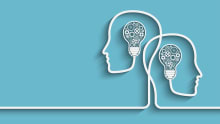Addressing the skill gap for freshers

"They used to say that if man was meant to fly, he'd have wings. But he did fly. He discovered he had to."
-Captain James T. Kirk, Star Trek
Discovery. That’s the common factor between the above quote & organizations where new roles and careers are being shaped by ‘evergreen skills.’ The traditional ways of hiring and working have been demolished. Instead, the new reality world is more inclined towards multidisciplinary approach, agile & creative mindsets and future leaders who take risks, see failures as a learning opportunity and pull their teams up. Because this is the secret formula to success not just for workforces but organizations too. That’s the discovery!
A recent survey by NASSCOM has revealed that more than 50% Indian professionals will have to upskill themselves to match the changing dynamics of the industry. Adaptability, reasoning, critical thinking, agility, risk-taking and strong communication skills are most sought-after, in any fresher or senior professional today. So how does one acquire these skills—are they inborn/ require special training or degrees? Let’s explore.
The world around us has changed immensely. What was relevant a decade ago, doesn’t even exist today. Organizations have re-discovered their assets—not ambitious business strategies, but workforce, who power growth and innovative ways of improving the business and strategies. Enter the ‘evergreen skills’ as mentioned above. These skills will outlast any change --predicted or unforeseen—and can slip into any role or multiple roles with immense ease. With this new learning, it’s no wonder then, that organizations within Indian and across the world are giving greater emphasis to people development initiatives, upskilling, and honing soft skills and life skills. Why? Because
A McKinsey study found that the demand for emotional skills across all industries in the United States will grow by 26% between 2016 and 2030. In my opinion, it will be the same story in India. Every human is blessed with these skills and the time to look within is here. All of us have been blessed with these skills. We just need to hone them.
To begin with, set a daily routine and follow it on a very disciplined basis. But make sure that you have a mixed bag—wherein work and fun create a positive setting and give you an extra energy boost. Make a daily priority list and simply follow it. Be mindful of yourself and others around you and maintain a daily journal which assists your self-reflection and gives insights. Don’t forget to have a gratitude list which will ensure that you appreciate the smaller things in life and help you grow as a person.
It’s been my experience that every step listed above counts in building a positive persona which is received warmly at the workplace. As a survey conducted by Zety suggests, 57% of top CEOs and recruiters say that teamwork is a vital skill. Similarly, 55% and 46% consider communication and time management to be the next in line of invaluable employable skills. Here are some skills that are in demand today:
- Be open, adaptive, and resilient: Life is an unpredictable adventure with challenges and rewards. Your attitude in this journey is the critical differentiator that will define your learning, experiences, and career trajectory at the workplace. So, when unforeseen changes happen, are you able to meet these challenges head-on? Can you adapt to the changing/changed environment and be unshakeable no matter how troublesome the pressure? Being flexible and resilient to the hard knocks of life will make you a valuable employee and human being.
- Role Juggler and People’s Person: The age of just being good with a single role are over. Now, it’s the age of the multi-role-professional and how you behave and deal with your colleagues and peers also matters, big. How good are you at managing emotions and behaviours of yourself and other people? A person with a positive attitude, team spirit, supportive, respectful of other people, a good listener and a good sense of humour is considered a huge plus.
- Problem solving mindset and communication: When faced with a daunting task or challenge, how do you respond to it? Your outlook and attitude matter here. Do you see this as an obstacle, or do you have a solutions-oriented approach to it? Keep information and communication simple and transparent. You will be always appreciated for a
- Learning Agility and ability to meet deadlines: The future is about your ability to be agile in picking skills and competencies that are relevant. No formal education set-up can prepare you for an event that cannot even be imagined now. Learn to learn what you need to—whether technical or life skills. Upskilling is a way of life, at workplaces now. And yes, discipline will always count so make sure you stick to all your deadlines by making a schedule.
The roles today may not exist a decade from now and we may be looking at a very different scenario. Degrees will continue to have relevance, but the era of a comprehensive professional has already dawned. Organization will continue to invest in people and focus on learning and development. You will learn a lot here of course. But do not forget that the greatest teacher and lifelong mentor will always be--life. Embrace the journey with all its challenges. Fearlessly.















